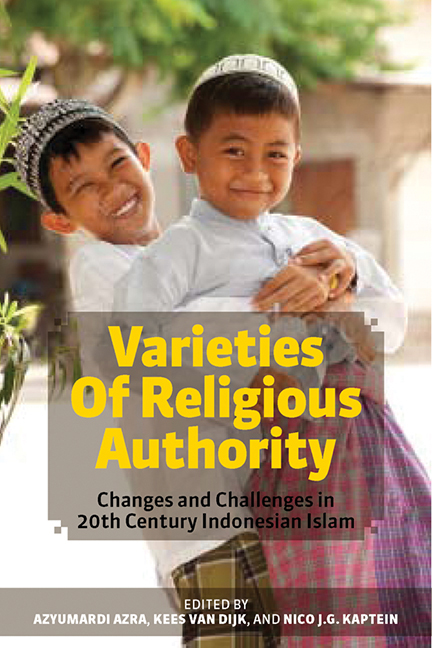Book contents
- Frontmatter
- Contents
- About the Contributors
- Acknowledgements
- Introduction
- 1 The Redefinition of Religious Authority among South Asian Muslims from 1919 to 1956
- 2 Understanding Al-Imam's Critique of Tariqa Sufism
- 3 Traditional Islam and Modernity: Some Notes on the Changing Role of the Ulama in Early Twentieth Indonesia
- 4 The Role and Identity of Religious Authorities in the Nation State: Egypt, Indonesia, and South Africa Compared
- 5 Authority Contested: Mathla'ul Anwar in the Last Years of the New Order
- 6 Struggle for Authority: Between Formal Religious Institution and Informal-local Leaders
- 7 The Indonesian Madrasah: Islamic Reform and Modernization of Indonesian Islam in the Twentieth Century
- 8 From Apolitical Quietism to Jihadist Activism: “Salafis”, Political Mobilization, and Drama of Jihad in Indonesia
- 9 From handling Water in a Glass to Coping with an Ocean: Shifts in Religious Authority in Indonesia
- 10 Religious Authority and the Supernatural
- Index
1 - The Redefinition of Religious Authority among South Asian Muslims from 1919 to 1956
Published online by Cambridge University Press: 21 October 2015
- Frontmatter
- Contents
- About the Contributors
- Acknowledgements
- Introduction
- 1 The Redefinition of Religious Authority among South Asian Muslims from 1919 to 1956
- 2 Understanding Al-Imam's Critique of Tariqa Sufism
- 3 Traditional Islam and Modernity: Some Notes on the Changing Role of the Ulama in Early Twentieth Indonesia
- 4 The Role and Identity of Religious Authorities in the Nation State: Egypt, Indonesia, and South Africa Compared
- 5 Authority Contested: Mathla'ul Anwar in the Last Years of the New Order
- 6 Struggle for Authority: Between Formal Religious Institution and Informal-local Leaders
- 7 The Indonesian Madrasah: Islamic Reform and Modernization of Indonesian Islam in the Twentieth Century
- 8 From Apolitical Quietism to Jihadist Activism: “Salafis”, Political Mobilization, and Drama of Jihad in Indonesia
- 9 From handling Water in a Glass to Coping with an Ocean: Shifts in Religious Authority in Indonesia
- 10 Religious Authority and the Supernatural
- Index
Summary
PROLOGUE: RELIGIOUS AUTHORITY IN ISLAM
Authority in the abstract sense — as distinguished from shear power, force or violence — can be defined in Weberian terms as the right to impose obedience in the name of common values and rules of conduct, shared by those who exercise this authority and those who are submitted to it (Hardy 1986, pp. 42–43). Religious authority means therefore the right to impose rules which are deemed to be in consonance with the will of God. In Islam, the very notion of authority is problematic, for it is vested in principle only in Allah, Who is the only sovereign, and Who does not delegate His right to frame rules, but only His command to obey His rules as known through revelation (Gardet 2002, p. 281). This situation is therefore different from that which prevails for instance in Christianity, where the Church, and those who rule it, are empowered to frame rules of conduct. In Islam, it is thus only in a secondary sense that those who relay the command of Allah are said to have authority. Therefore in this chapter we will use the term “authority” in this secondary sense.
Now through which channels is this command of Allah relayed? Which are the persons or institutions which transmit it to the believers, and can be considered as the holders of authority? It is not easy to answer this question, since in Islam there is no religious sphere completely separated from the profane sphere, where one could find a church, or a clergy with the exclusive monopoly of religious authority (Gardet 2002, p. 280). In fact, as I have argued elsewhere (Gaborieau and Zeghal 2004, pp. 6–8), the transmission of Allah's command follows three lines of delegation, which are not on the same plane.
The first two, which are more properly religious and can be combined in the same person are distinguished as two opposed ways of knowing God's command; they are traditionally termed exoteric (zahiri) and esoteric (batini).
- Type
- Chapter
- Information
- Varieties of Religious AuthorityChanges and Challenges in 20th Century Indonesian Islam, pp. 1 - 16Publisher: ISEAS–Yusof Ishak InstitutePrint publication year: 2010

